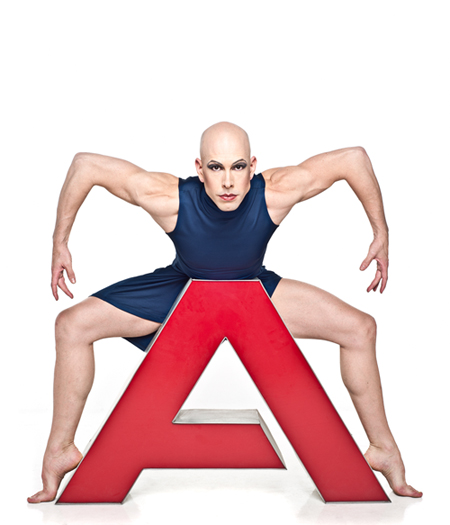Interview with Actor Wade McCollum
qPDX: Why don’t you introduce yourself Wade, and tell us who you’re playing in Angels in America and a little bit about yourself?

Wade McCollum plays Prior Walter in the Portland Playhouse production of 'Angels in America.' Photo by Laura Domela
Wade McCollum: I play Prior and I’m an actor who’s been in and out of Portland for many years. I’m based in New York City these days, and I’m thrilled to be back in Portland for the holiday season.
q: Is it exciting to be back, and do you have any plans to come back in the future?
WM: No present plans to come back in the future. I’m just enjoying my time here now. It is always, always delicious to come back to Portland. The culture, the community, the city itself, it’s like a gay fantasia. It’s like a little, amazing village in the woods compared to New York City filled with amazing, liberal-minded people. It just, this is home in so many ways. So it’s nice to return around the darkest time of the year and be filled with the light of y’all.
Well thank you. How did you get involved with this production? What started it?
When I was 14 I read this play. I went to Bloomsbury Books in Ashland, Oregon, and I don’t remember how I heard about the play but I did and I was in the process of coming out. And I went to Bloomsbury Books and I pulled both parts off the shelf, and I sat in the drama section in a little corner on a little, tiny stool and I read the entire thing cover to cover and I wept and wept and wept. And I remember I got a hard-on sitting in the bookstore reading the fucking scene in the park and all that crazy, sexual energy between Joe and Lewis. And it was the first time I’d ever read or seen a portrayal of a gay man, or a gay person for that matter, as a prophet. Somebody who’s filled with the divine energy of the spirit, and being kind of a profoundly spiritual person it was a real fulcrum on which my life turned. Tony really opened the door for me to see that the sacred and the homosexual are not mutually exclusive, and so I’ll always be in deep gratitude to him for writing this piece of theatre. It was a huge, seminal moment in my life and also a seminal moment in kind of American theatre history, and I also think in homosexual politics.
I guess that would be the seed where it all began. The next year, the Broadway tour with Stephen Spinella playing Prior came through Portland, and I drove up with a friend and we watched the entire two parts in one day. And I just remember from moment one saying I must play that part. One day, I will play that part. And all through college I remember people asked, what part do you want to play someday? Prior in Angels in America. So this is my first time getting to fulfill that dream or fantasy or goal that has been since I was a teenager.
About a year and a half ago, Brian and I talked, kind of just brainstormed about cool projects. This of course is always when I mention to artistic directors. Then about a year ago he called and said hey, I think we’re going to do it, do you think your schedule will be open? And as it got closer, it looked like it was.
Why are you drawn to that character specifically? Are there things that you just wanted to portray on stage or that you wanted to identify with on any level? Talk to me about that process or why you feel so connected to playing that particular character.
Wow, I’ve never really deconstructed it. It’s like a light that drew me. It’s the one that drew me. I have such a deep respect and appreciation for every single character in this play, they’re all my favorite. They’re all my superlatives. They’re all fucking gems. And so from an objective point of view, they’re all this beautiful menagerie of exquisitely rich and multidimensional humans who are doing the best they can amidst very, very, very trying circumstances. And yet, Prior is the one – it just seems like his skin and my skin are very close, and I knew that from the beginning. The part that seems most closely knit to my propensities.
Clearly for you and I think for many people, it was a transformative moment to first read or see this play when it came out 20 years ago. How do you think it has stayed relevant, or perhaps in some ways hasn’t or changed over those 20 years?
I think that a good piece of theatre will always remain relevant. It’s dealing with universalisms. It’s dealing with timeless themes, tropes that are kind of throughout history. Even in the play, we address prior plagues, no pun intended. Prior’s ancestors come back and say I died of this plague, I died of this plague. So even AIDS, in and of itself, if looked at like an epidemic such as the bubonic plague, it is a universal theme in a way of human history and the cycles of disease.
And then the relationships that the humans are undergoing, they’re so transpersonal. I think, they’re at once very extreme. You have a pill-popping Mormon housewife and her closeted gay husband, and yet the things they’re going through, I think almost any relationship you can relate what they’re going to. The secrets we hold, what we choose to withhold from our partners even though they’re the closest person to us, how those secrets can strengthen or completely dissolve a relationship. So I think there’s elements within the play that will always be relevant, and then I think of course there are topics and political segments of the play that are very historic and very specific to that time period. And in that way, it is period-specific, and yet sadly those political tropes are still highly applicable and unfortunately still something we need to be examining.
The import is almost twice as much because it feels like 20 years later we’re still fucking dealing with the same goddamn bullshit. So how does theatre confront audiences with themselves and their political situations, and what does effect change? I feel like the play planted seeds 20 years ago, and to take a look at it 20 years later and say have we come anywhere, politically, from where we were then or are we still in the mire of that? That deception or whatever.
Do you think that the experience of then presenting this play in Oregon is a little bit different than in perhaps other places, and how has that affected how the cast works together and how’s it working with Portlanders on a production that’s not in New York?
I think, on one hand, the Portland audience specifically – I can’t really say Oregon audiences – are going to tend to be way more open to the sexual themes, the political themes, and I think that generally speaking, this cast is exquisitely malleable and they’re open to the spirit of the play and the humor of the play and all of the different parts of the play.
I feel like doing it on this coast is probably very different than doing it on the other coast. I can’t necessarily say specifically in what ways. I haven’t done it there, and I haven’t done it yet here. I could only make suppositions about how an audience will receive it. But the cast is certainly embracing every aspect of this piece. There’s no – at least from my experience, no resistance to exploring a very dark part of human nature or you know, a really uncomfortable piece of subject matter. I feel like this is a really fearless group of people, and I can only speak to this group of people but I commend our fearlessness going forward with this play.
And if down the road in a year or two if you did decide to do part two, would you be on board in Portland for that project?
Oh God, yes. It would be fantastic to do part two. And of course it’s always just the kind of whim of scheduling project and all of that, but I’m so grateful that this time I was able to come back and do this.
Is there anything else that you want people to know about the production?
It’s one of those that I know people will want to have seen it, and I’m just hoping that the word gets out quickly and disperses quickly enough so that those that want to can come and don’t miss it, because it’s such a brief window and it’s going to be such a precious piece.


[…] Angels in America opens this week. Check out our interview/preview […]
[…] Tony Kushner’s epic play about the AIDS crisis in the 80s, Angels in America: Millenium Approaches, is all about juxtapositions, and the Portland Playhouse does this expertly. We wonder if the tropes presented in this production remain relevant and Director Brian Weaver’s 8 person cast proves that it is. You can hear what Weaver and principal actor Wade McCollum have to say on the continued relevancy of the Angels, as well as AIDS in the 21st century, in an interview from last week. […]
[…] I hope you didn’t miss this epic production but in case you did you can read the full review, and everyone can get a little more info with backstage interviews with lead Actor Wade McCollum and Director Brian Weaver. […]